Seguimiento de los programas de transferencias monetarias
Los firmantes del Gran Pacto se comprometieron a aumentar el uso de los PTM y a utilizar marcadores comunes para medir estos incrementos. Aunque el seguimiento del volumen de los PTM está comenzando a realizarse de manera más efectiva, todavía persisten los desafíos técnicos y políticos. Estos incluyen:
- Definir qué datos se desea recolectar y cómo recolectarlos;
- Garantizar el compromiso y el uso de las categorías de datos y sistemas;
- Abordar las deficiencias de los sistemas de notificación existentes que no han sido diseñados para incluir o desagregar, dinero en efectivo, cupones y otras modalidades;
- Llegar a un acuerdo común sobre las categorías estándar para la presentación de informes a fin de evitar datos incompletos e incoherentes.
Prioridades actuales
Desde 2017 a 2019, la CALP Network colideró el Subgrupo de trabajo de asistencia en efectivo del Gran Pacto sobre el seguimiento de los PTM junto a la Dirección General de Ayuda Humanitaria y Protección Civil de la Comisión Europea (DG ECHO, por sus siglas en inglés), con el principal objetivo de acordar los requisitos mínimos para el seguimiento de los PTM. Esto incluye la integración de los PTM en los sistemas y plataformas de información interinstitucional clave, a saber, el Servicio de Seguimiento Financiero (FTS, por sus siglas en inglés) y el módulo de proyectos HPC de la Oficina de Coordinación de Asuntos Humanitarios (OCHA, por sus siglas en inglés), el Estándar de Datos de la Iniciativa Internacional para la Transparencia de la Ayuda (IATI, por sus siglas en inglés), y los informes de 3W (quién hace qué, dónde). El subgrupo de trabajo sobre seguimiento de los PTM ha sido fusionado en el subgrupo de trabajo de eficiencia, eficacia y relación costo-beneficio, que la CALP Network seguirá coliderando.
Contenido destacado

Tracking Cash & Voucher Assistance Workshop – Part 2: Report
Presentation
Do you want to read the latest on discussions on how to best track cash and voucher assistance in global interagency reporting systems? The CALP Network and ECHO have just released Tracking Cash & Voucher Assistance Workshop – Part 2: Report. Key recommendations emerging from the workshop are summarized below. These will be used in the coming months as a basis to develop guidance for...

Measuring Cash Transfer Programming – Scoping study
Report
This scoping study explores technical and policy issues that are constraining progress towards better measurement and reporting of Cash Transfer Programming (CTP) and addresses these to identify ways forward. The study was developed with the following objectives: • Map and document how different implementing agencies and donors are measuring cash and voucher programming data at the...

Tracking Cash and Voucher Assistance: Agreements, recommendations and minimum requirements from the Grand Bargain cash workstream
Guidelines and Tools
This document comprises the key outputs of the work undertaken through the Tracking Cash and Voucher Assistance (CVA) Working Group from 2017 to 2019. The Tracking CVA Working Group was established as the
platform for engagement and decision-making for the sub-workstream on Tracking CVA, which is part of the Grand Bargain Cash Workstream. The Tracking CVA sub-workstream was co-led by the the...
Líder temática
Últimos recursos
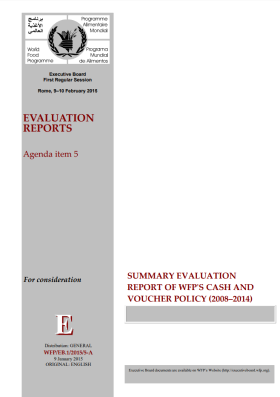
Summary Evaluation Report of WFP’s Cash and Voucher Policy (2008-2014)
Report
The WFP’s Summary Evaluation Report on cash and voucher policy (2008-2014) was commissioned by WFP’s Office of Evaluation in order to assess the quality and results of the policy and its implementation. The evaluation found that although the policy does not represent WFP’s current best...

A Review of Evidence of Humanitarian Cash Transfer Programming in Urban Areas
Report
Urban poor populations frequently experience disasters of varying typology and intensity. When set against a backdrop of poverty and marginalisation, their needs can be complex. As recent urban crises have pushed humanitarian agencies to respond in urban areas, this literature review examines the...
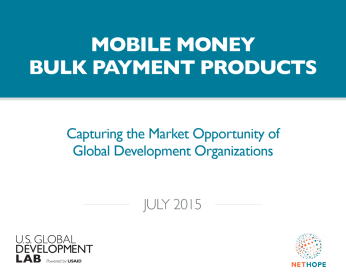
Mobile Money Bulk Payment Products: Capturing the market opportunity of global development organizations
Presentation
International relief and development organizations (DOs) receive significant aid funding from donors, which they regularly disburse in high volume, low value payments to millions of recipients for program and operational expenses. DOs and donors are increasingly using and promoting the use of new digital...

A Review of Evidence of Humanitarian Cash Transfer Programming in Urban Areas: Annexes
Report
Annexes to accompany the working paper ‘A review of evidence
of humanitarian cash transfer programming in urban areas”

Can Emergency Cash Transfers ‘Piggyback’ on Existing Social Protection Programmes?
Policy paper
This background note focuses on the current discussion among actors in the humanitarian and social protection sectors regarding the use of existing social protection programmes to provide an emergency response. It outlines the overlaps between social protection and humanitarian responses, considers a...
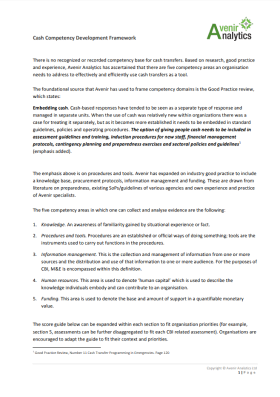
Cash Competency Development Framework
Guidelines and Tools
There is no recognized or recorded competency base for cash transfers. Based on research, good practice and experience, Avenir Analytics has ascertained that there are five competency areas as an organisation needs to address to effectively and efficiently use cash transfers as a tool.
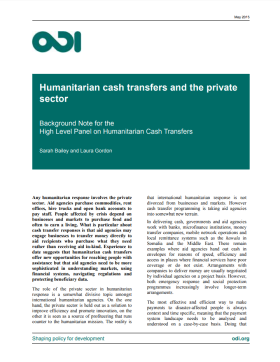
Humanitarian Cash Transfers and the Private Sector
Policy paper
The role of the private sector in humanitarian response is a somewhat divisive topic amongst international humanitarian agencies. This publication discusses the challenges and obstacles to a more effective engagement between the private sector and humanitarian actors as well as the potential role...

Remittances to Syria: What works, where and how
Report
This study sought to understand remittance flows into Syria, and established that various Informal Value Transfer Systems (IVTS) are used, to the exclusion of the formal banking sector. Registered and unregistered hawala, courier services and family connections are used. Remittances have played an...
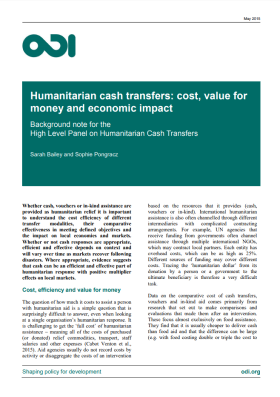
Humanitarian Cash Transfers: Cost, value for money and economic impact
Policy paper
The question of how much it costs to assist a person with humanitarian aid is a simple question that is surprisingly difficult to answer, even when looking at a single organisation’s humanitarian response. It is challenging to get the ‘full cost’ of humanitarian assistance – meaning all of the...
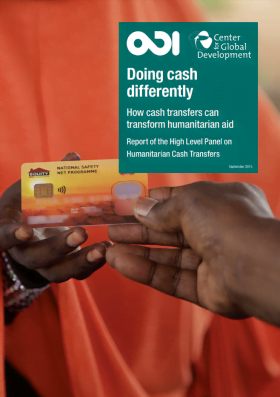
Doing Cash Differently: How cash transfers can transform humanitarian aid?
Policy paper
This report commissioned by the Overseas Development Institute highlights why giving aid directly in the form of cash is often a highly effective way to reduce suffering and to make limited humanitarian aid budgets go further. The publication, ,written by the High Level Panel on Humanitarian...

Know Your Customer Standards and Privacy Recommendations for Cash Transfers
Guidelines and Tools
This report reviews how Know Your Customer (KYC) standards – rules designed to combat criminal money laundering and terrorism financing – are applied in humanitarian cash programs. The report examines the practices of aid agencies and their processing of the personal information of...
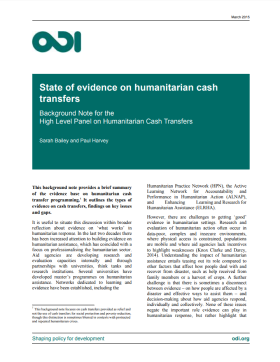
State of Evidence on Humanitarian Cash Transfers
Policy paper
The “State of evidence on humanitarian cash transfers” background note provides a brief summary of the evidence base on humanitarian cash transfer programming. The report also outlines the types of evidence on cash transfers, findings on key issues and gaps. This publication is an output of the...

Challenges and the State of Play of Interoperability in Cash Transfer Programming
Guidelines and Tools
This study explores the factors driving the design of interoperability for Cash Transfer Programming. It outlines the rapidly changing environment in which digital services are emerging, the types of digital collaborations that could be enabled, and the key design challenges that confront effective...
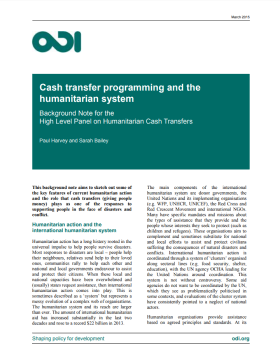
Cash Transfer Programming and the Humanitarian System
Policy paper
Cash transfer programming and the humanitarian system background note aims to sketch out some of the key features of current humanitarian action and the role that cash transfers play as one of the responses to supporting people in the face of disasters and conflict. Additionally, the publication...

Kit for Autonomous Cash transfer in Humanitarian Emergencies (KACHE)
Guidelines and Tools
The present document reports the development of the Kit for Autonomous Cash transfer in Humanitarian Emergencies (KACHE), built upon Red Rose ONE system© supported by the WFP’s Cooperating Partners’ Innovation Fund (CPIF). Firstly, it gives a brief description of the main features of the kit....
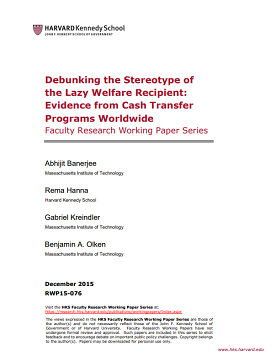
Debunking the Stereotype of the Lazy Welfare Recipient: Evidence from Cash Transfer Programs Worldwide
Report
Targeted transfer programs for poor citizens have become increasingly common in the developing world. Yet, a common concern among policy makers – both in developing as well as developed countries – is that such programs tend to discourage work. We re-analyze the data from 7 randomized controlled...

Value for Money of Cash Transfers in Emergencies
Report
The objective of this study is to analyse evidence on the Value for Money (VfM) of cash transfers. The study reviews evidence on the economy, efficiency and effectiveness of cash, vouchers and in-kind transfers, in order to support a more structured analysis of the VfM of different transfers. It is based...
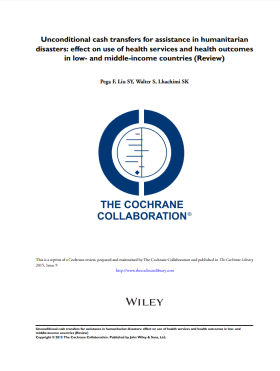
Unconditional Cash Transfers for Assistance in Humanitarian Disasters: Effect on use of health services and health outcomes in low- and middle-income countries
Report
Unconditional cash transfers (UCTs) for humanitarian assistance during disasters may improve health in low- and middle-income countries (LMICs) by giving recipients additional income. This study sought to assess the effect of UCTs on health services use, health outcomes, social determinants of health,...
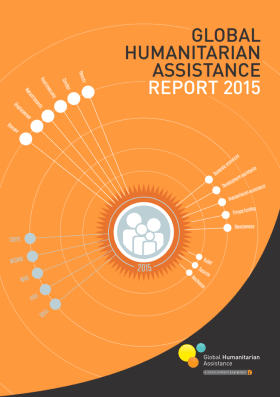
Global Humanitarian Assistance Report 2015
Report
Humanitarian financing is in the spotlight like never before. An extraordinary combination of crises continues to test international, national and local capacity to prevent, prepare and respond as needs continue to outstrip available resources. Global processes taking place during 2015 and 2016 –...

2015 State of the Industry Report. Mobile Money
Report
Mobile money is reaching more than 411 million people globally. Moreover, it is available in 85% of countries where the vast majority of the population lacks access to a formal financial institution. This is an extraordinary achievement, demonstrating the power of mobile, underpinned by the critical...



